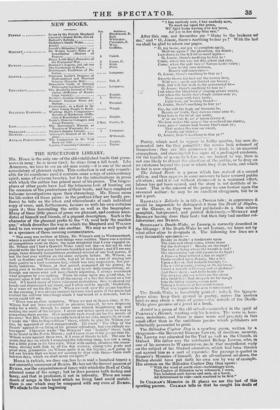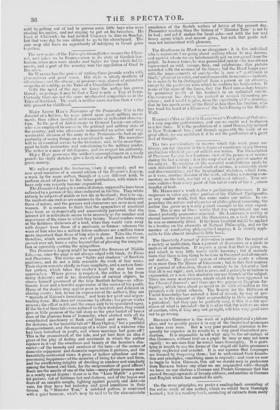Poetry, which used to appear in bulky quartos, has now
degenerated into the thin pamphlet: the verses look ashamed of themselves : they are like primroses in a frost, in an ungenial atmosphere, and showin, but few signs of a prolonged existence. Of the bundle of poeinal a before us, we lament to say, there is not one likely to attract the attention of the public, or to drag on an existence beyond time year in which they were born, and which in fact is now expired. The Island Bride is a poem which has arrived at a second edition, and thus appears in some measure to have secured public attention ; an it is not without claims—it is a sustained effort, labour has not been spared, and the story is not destitute of interest. This is the amount of the praise we can bestow upon the reverend author: he may be an excellent clergyman, but he is not a poet.
BADNALL.S ZeUnda is in title a Persian tale' in appearance it would be impossible to distinguish it from theBride of Abydos, or the Giaour, as they were first published—in a thin octavo pamphlet, hot-pressed, and printed deliciously,—MURRAY and BENSLEY having done their best : but then they had another collaborateur, one BYRON.
STODDART'S Death-Wake, or Lunacy, is correctly described in the titlepage : if the Death-Wake be not Lunacy, we know not by what other alias to designate it. The following few lines are a very favourable specimen:— Beauty in death ! a tenderness upon
The rude and silent relics, where alone Sat the destroyer ! Beauty on the dead ! The look of being where the breath is fled ! The unwarming sun still joyous in its light ! A time—a time without a day or night !
Death cradled upon Beauty, like a bee Upon a floe Cr, that looketh lovingly !— Like a wild serpent, coning in its madness,
Under a wreath or blossom and of gladness !
And there she is ; and Julio bends o'er
The sleeping girl,—a willow on the shore Of a Dead Sea ! that steepeth its far bough
Into the hitter waters,—even now Taking a foretaste of the awful trance
That was to pass on his own countenance !
The Death-Wake is beautifully printed : indeed, the typogra
phers alone keep their g-r i
ound n poetry, unless the modern binders may claim a share of praise—the outside of the DeathWake gives promise of a jewel of a book.
Astriel is a poem of the old school—somewhat in the spirit of PARNELL'S Hermit, wanting only his heroics. The verse is, however, melodious, and there is more sense and propriety in this small effort than in the ambitious poems which publishers are reluctantly persuaded to print.
The Billesdon Coplow Day is a sporting poem, written by a clergyman—the Reverend ROBERT LOWTH, of facetious memory. Mr. LOWTH was educated for the Turf as ‘vell as the Church, at Oxford. His father was the celebrated Bishop LOWTH, who, in one of his answers to WARBURTON, male that magnificent reply on the subject of his Oxford education, which had been thrown out against him as a sort of reproach: the passage is quoted in GIBBON'S Memoirs of himself. As an all-sufficient set-down, the Bishop should have put forth his own son by way of example. His sermon on the Billesdon Coplow Day thus opens:
"With the wind at north-east—forbiddingly keen, The Coplow of Billesdon ne'er witness'd, 1 ween, Two hundred such horses and men, at a burst, All determined to ride—each resolved to be first."
In COLMAN'S Memoirs (a fit place) we see the last of this sporting parson. COLMAN tells us that he caught his death of cold by getting out of. bed to pursue some little boys who were stealing his apples, and not staying to put on his breeches. He lived at Chiswick : he had invited COLMAN to dine on Sunday, but that very day he was obliged to go to the churchyard. The pair may still have an opportunity of indulging in broad grins together.
• The new series of the Tales. (j'a Gramlfather crossee the Channel, wet take S Us to France—even in its state of Gaulish barbarism, when men wore cloaks and tights for their whole habiliments, and a part of the country won the appellation of Gaul in Breeches.
Sii WALTER has the praise of writing these juvenile works with pleasantness and good sense. His style is utterly destitute of affectation ; and the absence of passion—nay, almost of animation —speaks of senility, as the Tales of a Grandiather should.
With the spirit of the age, we fancy the author has grown liberal ; or perhaps it may be that a Tory is only a Tory at home. Certainly there are not the same misdirected sympathies as in ihe Tales of Scotland. The work is neither more nor less than a valuable present for childhood.



























 Previous page
Previous page